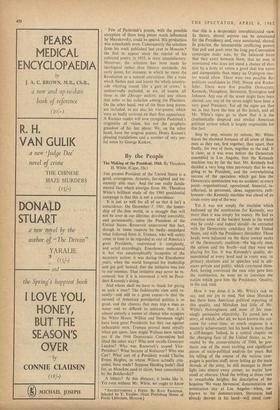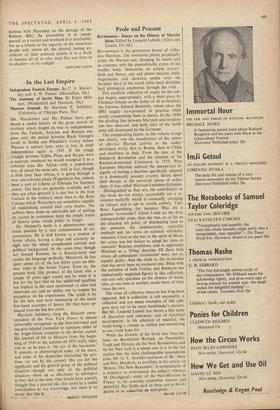By the People
The Making of the President, 1960. By Theodore THE present President of the United States is a good, courageous, dynamic, far-sighted and im- mensely able man. And the one really funda- mental fact which emerges from Mr. Theodore White's brilliant study of the 1960 presidential campaign is that this is not a coincidence.
It is just as well for all of us that it isn't a coincidence. On December. 7, 1941, the leader- ship of the free world, in a struggle that will not be over in our lifetime, devolved inevitably, and permanently, upon the President of the United States. Roosevelt understood this fact, though in some respects he badly misjudged what followed from it. Truman, who will surely come in time to be regarded as one of America's great Presidents, understood it completely, and acted accordingly. Eisenhower understood it, but was catastrophically incapable of the necessary action; it was during the Eisenhower years, when the world hungered for leadership and got golf instead, that the initiative was lost to our enemies. That initiative may never be re- covered; but if it is recovered it will be Presi- dent Kennedy's doing.
And whom shall wes have to thank for giving us such a man? The fashionable view until re- cently—and still to a great extent—is that the turmoil of American presidential politics is so great, and the chances that may trip a man so many and so difficult to estimate, that it 'is almost entirely a matter of chance who occupies the White House. Willkie and Stevenson might have been great Presidents; but they ran against unbeatable men. Truman proved most royally when put upon; how might Wallace have turned out if the 1944 Democratic Convention had tilted the other way? Who now recalls Governor Landon? Who was Roosevelt's second Vice- President? What became of Kefauver? Who was Cox? What sort of a President would Charles Evans. Hughes, to whom Wilson actually con- ceded, have made? Suppose Harding hadn't died (or, as Mencken used to claim, been assassinated by the Bolsheviki)?
A lottery? At this distance, it looks like it. Yet even without Mr. White, we ought to know
* STICHOTVORENIA I POEMI. By Boris Pasternak. Selected by Y. Vasiliev. (State Publishing House of Poetic Literature, Moscow.)
that this is a desperately unsophisticated view. In theory, almost anyone can be nominated for the Presidency and, once nominated, elected. In practice, the innumerable conflicting powers that pull and push over the long pre-Convention campaigns make sure, by the balanced force that they exert between them, that no man is nominated who does not stand a chance of elec- tion by a body of voters a good deal less naive and stampedable than many an Orpington elec- tor would allow. There were two possible Re- publican candidates in 1960; Nixon and Rocke- feller. There were five possible Democrats; Kennedy, Humphrey, Stevenson, Symington and Johnson. Any one of the seven might have been elected; any one of the seven might have been a very good President. Yet all the signs are that we in fact have the best of the bunch, and all Mr. White's signs go to show that it is the cisatlantically despised and reviled American political system which is largely responsible for this fact.
Step by step, minute by minute, Mr. White traces the electoral fortunes of all seven of these men as they ran, first together, then apart, then finally, for two of them, together to the end. It is clear, as it was even before the Democrats assembled in Los Angeles, that the Kennedy machine was by far the best. Mr. Kennedy had decided a very long time previously that he was going to be President, and the overwhelming success of the operation which got him the Democratic nomination was no accident; at every point—organisational, operational, financial, in- tellectual, in personnel, ideas, supporters, ruth- lessness—the Kennedy machine was ahead of its rivals every step of the way.
Yet it was not simply the machine which buttoned up the nomination for Kennedy, any more than it was simply his money. He had to convince some of the hardest heads in the world that he could—and indeed should—be entrusted with the Democratic candidacy for the United States, and with the Presidency thereafter. Those heads were balanced on the three uneasy necks of the Democratic coalition—the big-city men, the unions and the South—and they were not playing for fun. It was Kennedy's quality, de- monstrated at every level and in every way, in primary elections and in speeches and in alli- ances private and public, which convinced them. And, having convinced the men who gave him the nomination, he went on to convince the nation which gave him the Presidency. Quality, in the end, told.
How it was done it is Mr. White's. task to say, and our joy to read. Not since .Mencken has there been American political reporting of this quality, and Mencken bad little of Mr. White's thoroughness and none of his stun- ningly persuasive objectivity. To crowd into a story, of which, after all, we have known the out- come for some time, so much suspense is a masterly achievement; but his book, is more than a cliff-hanger. Indeed, in a central chapter on the changing face of the United States, as re- vealed by the census-returns of 1960, he pro- duces one of the most exciting and significant pieces of socio-political analysis for years. But his telling of the course of the various cam- paigns is peerless stuff; never letting go the main threads of the story, he still manages to throw light into almost every corner, no matter how small or obscure. (And the writing at times rises to remarkable heights; his description of the hopeless 'We want Stevenson' demonstration on nomination day at Los Angeles—when, un- known to the demonstrators, Stevenson had already thrown in his hand—will stand com-
parison with Macaulay on the passage of the Reform Bill.) As journalism it is unsur- passed; as a record and textbook it is invaluable; but as a tribute to the sagacity of the American people and, above all, the shrewd, lasting ex- cellence of their political system it is a book to hearten all of us who must live our lives in its shadow—or its sunlight.
BERNARD LEVIN BERNARD LEVIN



































 Previous page
Previous page